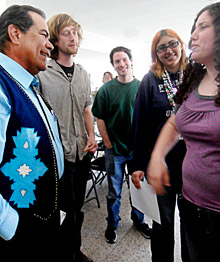Spring Break Volunteers Help Houma Tribe
Many members of the United Houma Nation, an Indian tribe in the bayou country of south Louisiana, scattered after Hurricanes Katrina and Rita in 2005, Hurricanes Gustav and Ike in 2008, and the Gulf oil spill in 2010. A group of six Tulane students spent spring break helping the tribe locate “lost” members.

Principal Chief Thomas Dardar Jr., left, welcomes Tulane students, from left, Kevin Morgan-Rothschild, William “Gus” Woods, Maggie Miggliozzi and Colleen Billiot, who worked with the Houma Nation during alternative spring break. (Photo by Matthew Freimuth)
“Since we're of a younger generation, we understand social media technology, which was helpful to us as we acted as sort of detectives,” says Kevin Morgan-Rothschild, a senior from Amherst, Mass., who is president of Tulane Alternative Spring Breaks, a student-led service organization advised by the Tulane Center for Public Service.
He and Tulane senior Colleen Billiot, a member of the Houma Nation who is majoring in international relations, led the trip to Houma, La., in Terrebone Parish last week (March 8â“12).
The Houma Nation numbers about 17,000 individuals, says Billiot. Maintaining contact with members of the tribe is important, she says, because the Houma nation is “large but tight-knit.”
The tribe's member database is crucial as the group works toward recognition by the U.S. government.
“It was like doing genealogical research, calling family members to get information about their whereabouts,” says Morgan-Rothschild, a sociology and social policy major who was on his third alternative spring break. “It was interesting sociologically, to see how these people with a common ancestry have spread out throughout the greater New Orleans area and assimilated as New Orleanians, yet they continue to have a network of common identity as part of the Houma Nation.”
During their visit the students sampled Indian tacos and traditional fry bread, danced to Zydeco music, went oyster trawling with a fisherman and ate gumbo at the home of Thomas Dardar Jr., principal chief of the Houma Nation.
The highlight of the trip came at a tribal council meeting, when the students waved a sheaf of papers containing new information to add to the tribal records and received a standing ovation. "Thanks to the students' effort we are further along in that process of reconnecting with our displaced families," says Chief Dardar.
